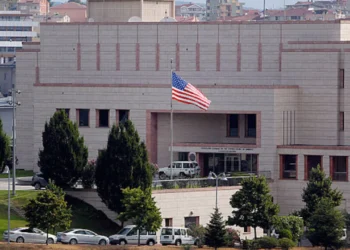Donald Trump is at it again. In his latest Truth Social rant, the former U.S. president declared a 100 percent tariff on all movies made outside the United States. According to him, foreign countries are “stealing” America’s movie business “like candy from a baby.” But let’s pause, does the world really revolve around the U.S., and does this kind of policy even make sense?
Tariff or Tantrum?
This is not policy, it’s a tantrum. Trump is selling the idea that foreign filmmakers are the reason Hollywood is struggling, but anyone who watches movies knows better. Hollywood’s decline isn’t about foreigners, it’s about Hollywood itself: endless remakes, bloated budgets, and an industry that has failed to adapt to changing times. Blaming Nigeria, India, South Korea, or Europe for that is lazy politics. What Trump calls theft is actually competition, and America isn’t used to losing.

Trump keeps saying “Make America Great Again,” but let’s be clear, what he really means is “Make America the Only One.” The problem is, the film world has moved on. Nollywood is booming in Africa. Bollywood still commands billions in Asia. South Korea is dropping global hits left and right. Even small countries are producing content that travels across borders thanks to Netflix and streaming. No tariff can stop the world from watching what it wants to watch. Movies are not steel or corn; they’re culture. You can’t wall off culture with tariffs.
What Happens When the Rest of the World Fires Back
Here’s the part Trump never mentions: retaliation. If America slaps a 100 percent tariff on foreign films, do you think other countries will sit back and clap? No. They’ll respond. Imagine Europe banning Hollywood blockbusters. Imagine Nigeria taxing every Marvel movie to the point where nobody pays to watch them. Imagine Asia closing the door on U.S. streaming platforms. Who loses more, foreign filmmakers or Hollywood studios that depend on global audiences to survive? Trump is playing with fire, and the U.S. film industry could burn.
The funniest part of this policy is Trump framing it as a “national security threat.” Really? Since when did watching a French film or a Nigerian drama become a threat to American safety? If anything, the real security threat is ignorance, pretending the U.S. can dictate global culture by decree. Cinema is about storytelling, not borders. The idea that America will collapse because people are watching “Parasite” or “Anikulapo” is not only ridiculous, it’s insulting to audiences everywhere.
Who’s Really to Blame?
Instead of slamming tariffs on foreign films, maybe Trump should look inward. The U.S. is losing ground in film because of greed. Studios chase billion-dollar superhero sequels instead of investing in original stories. Independent filmmakers can barely breathe in Hollywood because the system is rigged against them. Streaming platforms have changed the game, but Hollywood hasn’t caught up. That’s the real theft, the theft of imagination. Foreign filmmakers didn’t steal Hollywood’s crown. Hollywood dropped it.
The World Doesn’t Need U.S. Permission
Trump talks like the world is waiting for America’s green light to tell stories. Wrong. Africa, Asia, Latin America, and Europe are already building their own film powerhouses. Tariffs won’t stop the rise of Nollywood, Bollywood, or K-dramas. They won’t stop streaming giants from investing in local content. They won’t stop global audiences from demanding something fresh. The truth is simple: the world doesn’t need U.S. permission to make or watch movies.
Trump’s movie tariff is not about saving Hollywood, it’s about stroking his ego. It won’t create jobs, it won’t make better films, and it won’t stop global competition. What it will do is isolate the U.S. and damage the very industry he claims to protect. The world has changed, but Trump is still stuck in the past, shouting at clouds and demanding the impossible. Movies are universal, and no border wall of tariffs can keep them locked inside America.

















